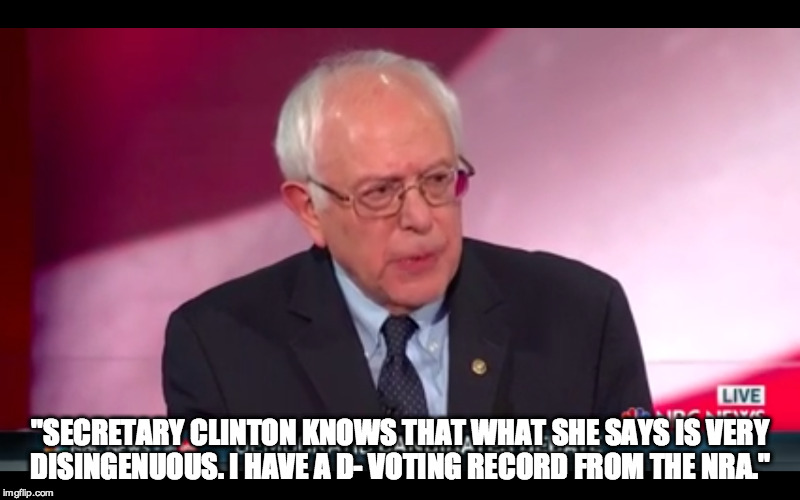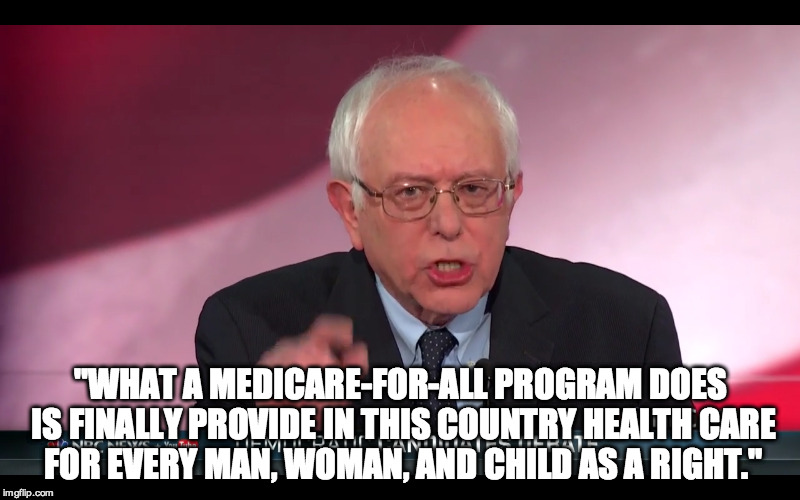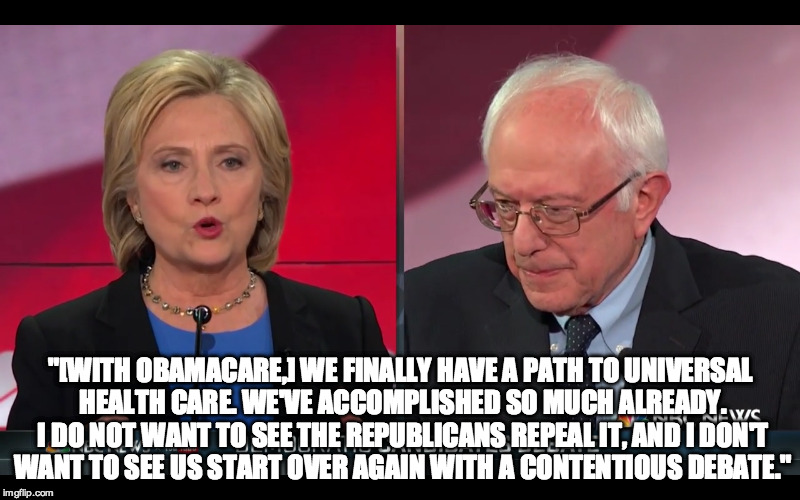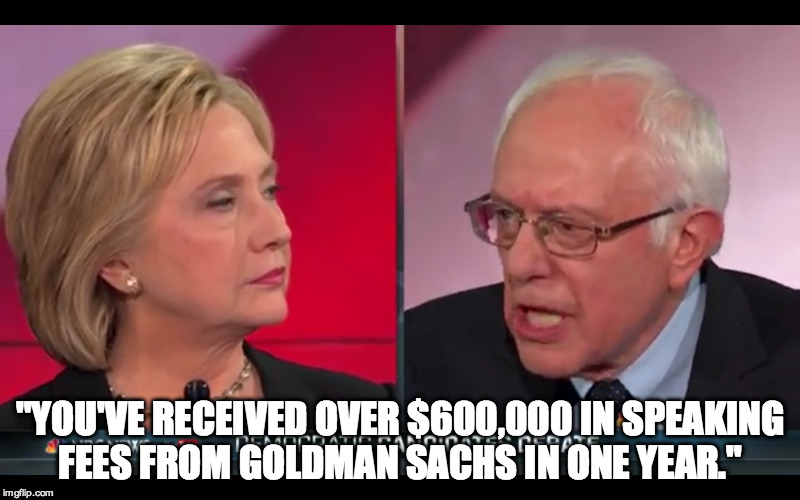4 Moments You Should Know From the Democratic Debate

By:
With Sen. Bernie Sanders closing in on Hillary Clinton in recent polls in Iowa and New Hampshire, the first two states to vote in the Democratic primary, last night's debate in Charleston, South Carolina, was the feistiest yet on the Democratic side. For the first time, both candidates looked comfortable directly attacking one another.
Here are four key takeaways from the Democratic primary debate Sunday night:
1. Gun control is the only issue where Clinton can attack Sanders from the left, and she took advantage Sunday night.
 NBC / YouTube
NBC / YouTube
The most contentious part of the evening began when the moderators asked Sanders to defend his record on gun control. In recent days, Clinton has sharply criticized Sanders for his softer approach on guns, particularly his votes against the Brady bill (a piece of gun control legislation) in the 90s, against allowing more gun safety research, and against holding the gun industry liable for damage caused by guns.
Sanders responded by saying that he's always supported instant background checks and that he only disagrees with holding small gun sellers liable when they have not broken the law. On the liability issue, multiple outlets agree that Sanders has changed his position since the beginning of the campaign. In 2005, Sanders voted for a law that now provides immunity to gun manufacturers and sellers. He's continued to hold that position throughout the campaign, with his campaign manager saying last June that Sanders would vote for the law again. Now, the campaign has said that Sanders supports amending the law to remove the liability except in the case of small, rural gun sellers servicing hunting communities.
 NBC / YouTube
NBC / YouTube
It's impossible to deny that Sanders has a mixed record on guns. Despite what he says now, a Sanders quote from 1990, unearthed by Buzzfeed, shows just how pro-gun Sanders was at one time: “Anyone who has any illusions that gun control will cause a significant dent in the very serious problem of crime is mistaken," Sanders once said to Vermont voters. As Buzzfeed explains, Sanders at that time was running for a seat in the U.S. House of Representatives. He was challenging an incumbent Republican, Rep. Peter Smith, whom the NRA disliked due to Smith's weak support for gun rights. The NRA endorsed Sanders, and Sanders leveraged his pro-gun bona fides during the campaign. Sanders won the election, and the next year he voted against a major gun safety bill.
For his part, Sanders is the increasingly rare Democratic senator hailing from a rural, predominantly white state, and that often requires strong support for gun rights. In a Democratic Party that is becoming more liberal, less white, and more worried about gun violence, this has put Sanders in a tough spot. It's also opened up one of the only areas where Clinton can attack Sanders from the left. On almost every other issue, Sanders has a more progressive view, and he's used his advantage with left-leaning liberals to narrow Clinton's lead in the early primary states. That's why we've seen Clinton aggressively attack Sanders on guns.
You can watch the heated exchange here:
2. The divide on health care perfectly reflected the difference between Clinton's pragmatism and Sanders' idealism.
Health care is another issue where Clinton has sought to put some distance between herself and Sanders. While she's attacked Sanders from the left on guns, she's tried to undermine his health care proposal from the right.
So what are their positions?
 NBC / YouTube
NBC / YouTube
Sanders advocates for a "Medicare for all" health care system where everyone would receive health care from the government. Right now, only seniors over 65 are eligible for Medicare. The plan would cost $1.38 trillion per year, a cost that would require tax increases on everyone. Sanders has argued, though, that middle class families would spend less money overall because scrapping private insurance costs would more than make up for tax increases. Under Sanders' plan, the wealthy and businesses would bear the bulk of the costs.
 NBC / YouTube
NBC / YouTube
Clinton has attacked this plan for two reasons. For one, she's against any tax increases on the middle class. Secondly, she doesn't think it's wise for Democrats to attempt another radical change to health care less than a decade after the agonizing process to pass Obamacare in 2010. (Most people blame the Obamacare process for Democrats losing the House of Representatives in 2010.) Instead, Clinton wants to stick with Obamacare, which attempts to provide health insurance to every American through a combination of private insurers, the federal government, and state governments, and build upon it.
Sanders' perspective is one of idealism about Democrats passing universal, public health care — a dream of the party since Roosevelt. Clinton's is a more measured, pragmatic approach that seeks to solidify the victories in Obamacare and protect them from Republicans, who have voted to repeal the law dozens of times in the past five years.
For the short-term, this debate is theoretical. In reality, it's extremely unlikely that a President Clinton or a President Sanders will have a Democratic Congress to pass new health care legislation any time soon. Particularly something as radical as Sanders' proposal.
That said, this issue highlights a key difference between the candidates — Sanders' left wing idealism versus Clinton's more moderate realism.
You can see the candidates debate health care here:
3. Clinton does not have a response when Sanders hits her Wall Street connections.
As he has in previous debates, Sanders continuously pivoted to the idea that Wall Street has too much power in Washington. On Sunday night, however, he was more pointed in criticizing Clinton's Wall Street connections.
 NBC / YouTube
NBC / YouTube
"You've received over $600,000 in speaking fees from Goldman Sachs," Sanders said, referring to Clinton's history of paid appearances at financial services companies. According to The Intercept, Clinton made almost $3 million from the financial industry after she left her post as secretary of state. The Intercept's Zaid Jilani tweeted out these numbers during the debate:
This is a tough issue for Clinton. She counted on Wall Street for support during her time in the Senate, representing the state of New York. (In a November debate, Clinton awkwardly defended this association by referencing 9/11.) But even after the crash and the Obama election wins in 2008 and 2012, Clinton was still taking money for speeches on Wall Street.
Clinton's deflected this attack saying that — while she won't go as far as Sanders — she will crack down on big banks and supports Dodd-Frank, the financial reform law passed by President Obama. Clinton also tried (likely unsuccessfully) to use Obama as a shield, saying that while Sanders also attacked Obama for being "weak" on Wall Street, it was Obama who led the country out of the Great Recession.
You can watch more of Sanders' Wall Street barbs here:
4. Clinton went out of her way to tie herself to President Obama.
If you're running in a Democratic primary in South Carolina, it's probably a good idea to praise President Barack Obama, who has a 90 percent approval rating among South Carolina Democrats. Clinton did not let the Charleston crowd forget that not only does she support the president's work these past seven years, but she also played a significant role in his administration when she served as his secretary of state.
Sanders showed love for Obama, too, but not without Clinton hitting him for his moments of lukewarm support of the president. Clinton pointed out that Sanders once suggested in 2011 that it would be a "good idea" if a Democrat challenged Obama in the 2012 election.
Obama's popularity is not just important in South Carolina. As Nate Silver mentioned, among Iowa Democrats, who will be casting the key first votes of the primary season on Feb. 2, the president has a 91 percent approval rating among likely Democratic voters.
